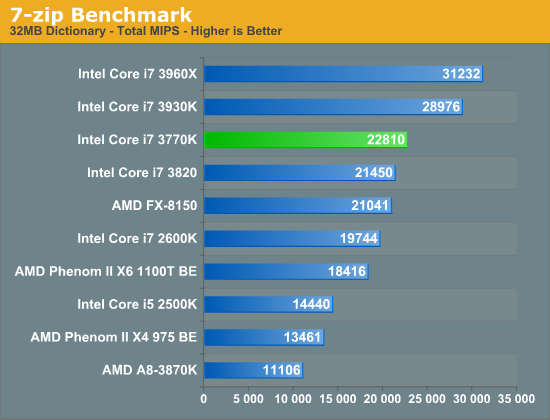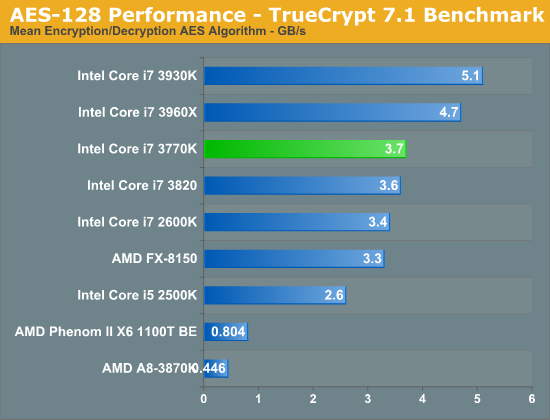The Ivy Bridge Preview: Core i7 3770K Tested
by Anand Lal Shimpi on March 6, 2012 8:16 PM EST- Posted in
- CPUs
- Intel
- Core i7
- Ivy Bridge
Compression & Encryption Performance
7-Zip Benchmark
By working with a small dataset, the 7-zip benchmark gives us an indication of multithreaded integer performance without being IO limited:

Although real world compression/decompression tests can be heavily influenced by disk IO, the CPU does play a significant role. Here we're showing a 15% increase in performance over the 2600K. In the real world you'd see something much smaller as workloads aren't always so well threaded. The results here do have implications for other heavily compute bound integer workloads however.
TrueCrypt Benchmark
TrueCrypt is a very popular encryption package that offers full AES-NI support. The application also features a built-in encryption benchmark that we can use to measure CPU performance:

Our TrueCrypt test scales fairly well with clock speed, I suspect what we're seeing here might be due in part to Ivy's ability to maintain higher multi-core turbo frequencies despite having similar max turbo frequencies to Sandy Bridge.










195 Comments
View All Comments
silverblue - Wednesday, March 7, 2012 - link
At the very least, AMD need a less power hungry successor to Bulldozer. From the Xeon review, it's mentioned that they should be in a position to do this, and could at least clock the thing a lot higher and still use less power than Bulldozer. Regardless, that IPC deficit is a killer - the following page is so telling of the architecture's current limitations:http://www.anandtech.com/show/4955/the-bulldozer-r...
abianand2 - Wednesday, March 7, 2012 - link
1. General curiosity: You stated you did not get a sanction or support from Intel for this preview. I believed that sort of a thing isn't allowed before the release date. How do exceptions like this work?2. Specific: I observed most of the discrete GPU tests were at 1680x1050, where there . Any reason for this? I guess it is since this is just a preview. Am I right? Any other reason?
Thanks
Kjella - Wednesday, March 7, 2012 - link
1. If you want to officially review the chip, you sign an NDA and Intel provides you with it. Here he got access to it from a partner, who probably broke their agreements but Anand never signed any agreement so he can publish whatever he wants.2. I would think so ,and in GPU bound scenarios I wouldn't expect much change at all.
InsaneScientist - Wednesday, March 7, 2012 - link
1) Generally what happens with previews and first looks is that the company producing a product (Intel) will send out press samples to reviewers if the reviewers will sign a Non Disclosure Agreement (NDA). When the NDA expires (generally the same time for everyone), the reviewers can post their findings to the public.This is done (I assume) to give reviewers enough time to thoroughly review a product without having (theoretically) to worry about having information leak until the company wants it to get out.
If, on the other hand, a reviewer acquires a product via other means so there is no NDA that they have to sign in order to get the product... well, they're not under NDA, so they're free to disclose whatever they want.
sld - Wednesday, March 7, 2012 - link
What a troll.Start crying when Intel is able to jack up prices by 2x - 3x when AMD is gone.
You don't even realise that his fears of a tock- means that since Ivy Bridge has more features, presumably pushed forward from Haswell, Haswell itself will bring less features to the table.
Hrel - Wednesday, March 7, 2012 - link
WHY!!!!? Does Intel HAVE to disable Hyper Threading on the sub 300 dollar CPU's? It's not like having in ENABLED costs them anything more at all. It would just be providing their customers with a better product. This shit is infuriating. It's there on the chip no matter what, HT should just be on every single Intel chip no matter what. That shit pisses me off SOOOO much.Exodite - Wednesday, March 7, 2012 - link
I would imagine there's going to be a fair few sub-300 USD dual-cores with HT down the line, though I suppose you meant specifically for the quads?The reason seem obvious enough for me, if you need the extra performance in applications that stand to gain from HT you'll have to pay for it.
Frankly I don't see the added cost as anything major, considering the gains.
It's just differentiation really.
Sure, we'd all want more stuff cheaper (or for free!) but lacking HT doesn't in any way cripple a chip.
sicofante - Wednesday, March 7, 2012 - link
It's called market segmentation.Hector2 - Wednesday, March 7, 2012 - link
Chill out. You'll pop a blodd vessel. With all that's happening in the world, THAT's what's pissing you off ? LMAOsld - Wednesday, March 7, 2012 - link
Intel's products get cheaper with smaller dies and with competition. Without competition, their dies cost the same to make, but they rob and loot your pockets and make obscene profits off you because your hated AMD no longer exists as an alternative supplier of good chips.